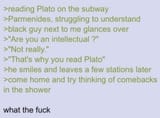>>17761007Plato had a lot of controversial opinions about religion.
He lays out a creation myth for the universe that involves zero traditional Greek Gods. Instead he believed that there was a single unknowable and incomprehensible source point, a universal mind that everything is a thought of which creates the perfect forms of everything, and the divine craftsman that tried to impress those forms into imperfect matter and resulted in an imperfect world.
If you notice, there's no Zeus, Kronos, Hera, Athena, etc. If they're involved, they either have to be rewritten to be aspects of the above, or just turned into more minor spirits and supernatural entities.
When he read myths and legends, he did so from a perspective that they were basically just metaphors and tall tales, rather than real religious documentation. And therefore he advocated for the censorship and rewriting of Homer and Hesiod and the like, in order to make the Gods and Heroes all more moral and good so they'd teach better lessons to the masses. If it wasn't a real story about something that actually might have happened, it could instead at least teach good civics lessons to children.
If you walked around the local agora and started talking about how this universe was a mere imperfect impression of the perfect world of forms that was the product of the divine mind and divine craftsman, and everything else that Plato thought and taught, you'd probably be in danger of being accused of blasphemy if not just insanity.
You could make an argument that seeing the world through the lens of forms could help one appreciate beauty more.
Plato believed that things that we think are beautiful are themselves basically conduits for the divine. Instead of just thinking that someone or something is pretty, you should instead try and interpret divine truth from it.
This followed the Greek fascination with geometry and mathematics. Where proportions and patterns were considered connected to the divine.



